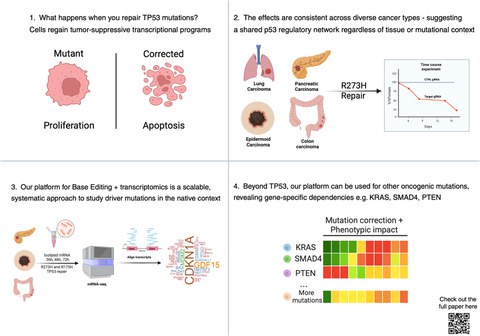Jul 31, 2025
Buchholz Lab Publication alert

Graphical abstract of the publication Wang et al
Our new study “A base editing platform for the correction of cancer driver mutations unmasks conserved p53 transcription programs” reveals how correcting TP53 mutations uncovers universal cancer weaknesses!
You can read the full publication here.
In our study, we aimed to functionally and transcriptionally profile cancer driver mutations, with a primary focus on TP53 - the most frequently mutated gene in human cancer. Using adenine base editing (ABE), we precisely corrected two TP53 hotspot mutations in a range of human cancer cell lines from different tissues.
Remarkably, correcting TP53 mutations revealed a highly conserved transcriptional p53 response following mutation correction, suggesting that the effects of TP53 hotspot mutations are largely independent of tumor origin and co-occurring mutations. Our platform can be adapted to study other key cancer driver mutations, offering a window into the unique ways different mutations enable cancer cells to survive and thrive. By mapping these mutation-specific dependencies, our work opens the door to more personalized and effective cancer treatments.
Congratulations to everyone involved!
